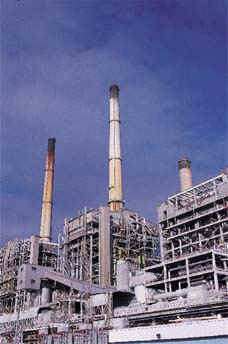
|
An example of the impact for an industrial customer with
a monthly electric usage of 5,000 megawatt hours would be a
monthly increase of $15,000. A customer with a monthly
electric usage of 1,000 megawatt hours would experience a
$3,000 increase per month.
Right: CP&L's coal-fired plant in
Roxboro
|
Air
quality legislation slows
to allow more time for review
A
clean air bill that sounds good at face-value could
significantly add to utility bills for North Carolina business
customers without bringing the desired effect, NCCBI Vice
President of Governmental Relations Leslie Bevacqua told the
House Public Utilities Committee on Thursday.
While NCCBI does not have a position opposing or supporting
the legislation, which has been introduced in the House and
Senate, Bevacqua stressed that the real impact of the
legislation should be studied before it moves forward.
“If the result of this bill will mean cleaner air for the
entire state and bringing non-attainment areas into
attainment, then it may mean opportunities for additional
industry to locate in North Carolina or for industry in the
state to expand,” Bevacqua said. “We do, however, need to
look at the costs involved and whether or not the benefits
outweigh the costs.”
No action was taken
on the bill in the House committee. The Senate version, S.
1078 Improve Air Quality/Electric Utilities (= H. 1015),
was favorably reported Wednesday by the Agriculture Committee
and was on Thursday’s floor calendar but was held over until
Monday so that a fiscal note could be developed.
The legislation would
require the state’s two largest electric utilities, CP&L
and Duke Power, to dramatically lower emissions of nitrogen
oxide (Nox) and sulfur dioxide from their 14 coal-fired power
plants. The reductions would lower atmospheric ozone and would
reduce the haze often seen in the air in the western part of
the state. The utilities would have to invest hundreds of
millions of dollars in pollution-control equipment at the
plants, with the costs passed along to consumers.
Based on information
provided by Duke Energy and CP&L, the impact of the
legislation on a customer's bill would vary depending on the
consumer's rate
schedule and usage patterns. The increase (based on average
preliminary estimates over a 12-year period and reflecting
levelized costs) will be between $2.50 to $3.50 per megawatt
hour. An example of the impact for an industrial customer with
a monthly electric usage of 5,000 megawatt hours would be a
monthly increase of $15,000. A customer with a monthly
electric usage of 1,000 megawatt hours would experience a
$3,000 increase per month.
“That impact will not just be on business and industry,”
Bevacqua said. “It will also impact state and local
government, schools, colleges and universities – all utility
customers.”
Furthermore, Bevacqua said, there is large amount of pollution
in western North Carolina caused by surrounding states. “It
is not clear how this legislation will translate into getting
Tennessee and the other surrounding states to do what they
need to do to help improve air quality in the North Carolina
mountains…. I would urge the members of this committee and
members of the House to take some time to be more deliberative
in your consideration of this bill so that we can, hopefully,
realize the full impact and the implications of passage of
this bill before you take final action.
 Sen.
Steve Metcalf (D-Buncombe) (left), the main sponsor of
the Senate bill, and Rep. Martin Nesbitt (D-Buncombe), the
sponsor of the House companion bill, argued that passage of
the measure would give North Carolina leverage to negotiate
reductions in emissions from power plants in other states,
particularly those operated by the Tennessee Valley Authority.
Officials believe that emissions from TVA plants blowing east
are a major cause of acid rain in the Blue Ridge Mountains. Sen.
Steve Metcalf (D-Buncombe) (left), the main sponsor of
the Senate bill, and Rep. Martin Nesbitt (D-Buncombe), the
sponsor of the House companion bill, argued that passage of
the measure would give North Carolina leverage to negotiate
reductions in emissions from power plants in other states,
particularly those operated by the Tennessee Valley Authority.
Officials believe that emissions from TVA plants blowing east
are a major cause of acid rain in the Blue Ridge Mountains.
CP&L and Duke Power Co., which own the 14 coal-fired
plants, have agreed to the emissions reductions called for in
the bill as long as they are allowed a mechanism for
recovering the estimated $2.2 billion in expenses they would
be required to make in pollution control equipment.
Return to Page One
|